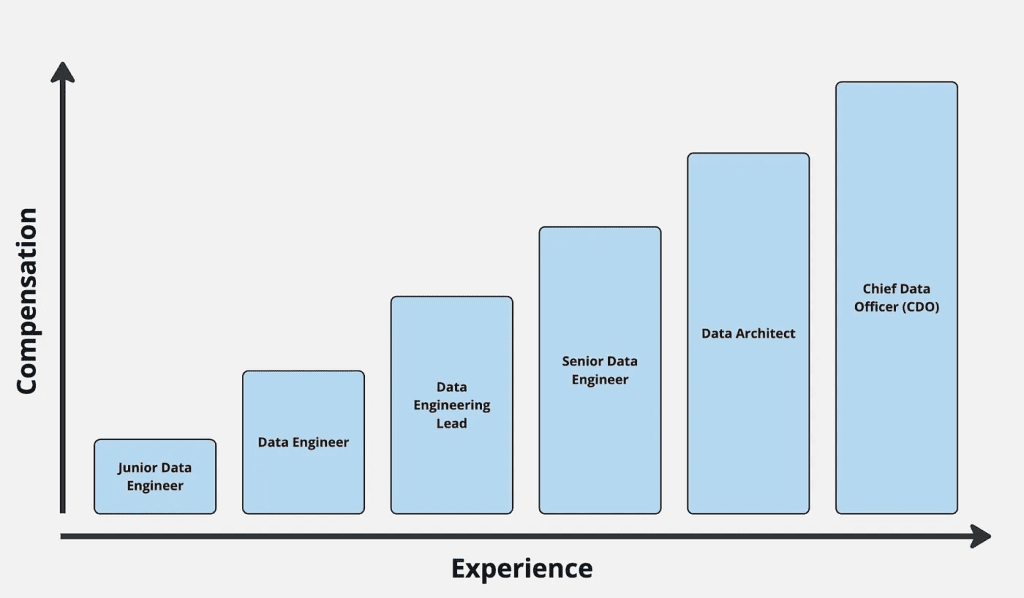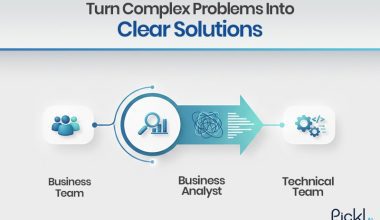Summary- Data engineering is one of the most demanding and fastest-growing careers. This guide provides you with the role of a data engineer, skills required, courses, roadmap, salary insights, and every challenge you will face in the journey.
Introduction
Data is the foundation of any business (healthcare, Saas, fintech, FMCG, or any other you can name), and the people who shape this data are data engineers. If you are someone who is interested in becoming a data engineer or is making a pivot to data engineering, this guide is for you.
It walks you through skills, certifications, a roadmap, and the path you need to follow. Whether you are starting from scratch, switching from another role, or looking to grow further, data engineering offers handsome opportunities.
What is the Role of a Data Engineer?
The key role of a data engineer is to build systems that can store large volumes of data in a compatible and easy-to-understand format. They ensure that data flows smoothly from various sources to systems where it can be easily analyzed. Without data engineers, businesses would struggle to work with the vast amount of data every single day.
Here are some key pointers that give a better clarity on the role of a data engineer:
- Data Collection and Integration: A data engineer collects data from multiple sources, including databases, APIs, applications, IoTs, etc, and brings them together in a centralized format.
- Data Pipeline Development: Build automated workflows that move raw data into usable formats.
- Data Cleaning & Transformation: A data engineer has to ensure that the data is consistent, accurate, and ready for analysis by handling missing values, duplicates, or errors.
- Security & Compliance: It’s necessary to ensure that data systems follow security best practices and comply with regulations like GDPR or HIPAA.
- Collaboration with Other Teams: You have to work closely with data scientists, analysts, and business teams to provide them with structured, reliable data.
Why Should You Consider Data Engineering as a Career?
Data engineering is one of the fastest-growing career options. The global data engineering market is set to grow from USD 29.1 billion in 2023 to USD 175.0 billion by 2030, according to the State of Data Engineering in India, 2025 report. Raw data isn’t useful; that’s where data engineering comes into play.
Here are some reasons for choosing data engineering as a career option:
High Demand Across Industries
Nowadays, businesses are investing heavily in data-driven systems. The demand for skilled data engineers is growing across finance, D2C, SaaS and various other sectors.
Excellent Salary
The role of data engineers command a good compensation along with various perks. Entry-level roles are lucrative, and senior positions pay exceptionally well.
Constant Learning Path
The field of data engineering is evolving rapidly with new tools, especially AI coming into picture. So there is continuous learning for tech enthusiasts.
Global Opportunities
Data engineering is not just scaling in India but across the globe. The professionals can find career opportunities across countries and industries.
Key Skills Required to Become a Data Engineer
In order to build a successful career as a data engineer, you need both technical and soft skills. Let’s understand both the types of skills in detail.
Technical Skills (Core Skills)
Proficiency in Programming
Languages like Python, Java, or Scala are essential for building pipelines and automating workflows.
Big Data Frameworks
A data engineer should have knowledge of tools such as Hadoop, Apache Spark, and Kafka is necessary for managing and processing large-scale data.
Database Management
Database Management: Strong command over SQL for relational databases (e.g., MySQL, PostgreSQL) for handling unstructured data.
Soft Skills
Problem-Solving Mindset
Ability to solve issues in data pipelines, optimize workflows, and design efficient solutions.
Communication Skills
Explaining technical processes in simple terms to non-technical stakeholders, such as business teams or management.
Attention to Detail
Ensuring data accuracy and reliability as small errors can lead to big business consequences.
Education and Certifications Required for a Data Engineer
While most of the data engineers have a computer science, IT, or mathematics background, you don’t always need a formal degree. You can still become a data engineer if you don’t have a similar background.
- Bachelor’s/Master’s degree in Computer Science or Data-related fields.
- Certifications like Google Cloud Professional Data Engineer, AWS Big Data Specialty, or Microsoft Azure Data Engineer.
- Bootcamps, training sessions, and online courses that focus on hands-on projects.
Roadmap to Become a Data Engineer
To become a data engineer, there is a step-by-step approach that you have to follow. If you follow a structured roadmap, you can build your expertise step by step. Here’s a practical progression you can follow:
Master the Fundamentals
It’s necessary to lay the foundation or master your fundamentals.
- Begin with Python for data handling and automation.
- Learn a second language like Java or Scala for big data frameworks.
Develop Strong Database Skills
- Gain expertise in SQL for structured data queries and optimization.
- Explore NoSQL systems like MongoDB to handle unstructured data.
Enhance the Basics of Big Data and Cloud Technologies
- Understand distributed systems like Hadoop and Spark.
- Build familiarity with cloud platforms (AWS, Azure, or GCP).
Work on Data Warehousing
- Learn warehousing tools such as Redshift or BigQuery.
- Practice ETL/ELT workflows using tools like Apache Airflow or Talend.
Build Real-World Data Pipelines
- Apply your skills by creating end-to-end pipelines on real datasets.
- Showcase projects in a portfolio or GitHub to demonstrate expertise.
Data Engineering Career Growth Path
Let’s see the growth trajectory of a data engineer.

Junior Data Engineer
- Works on basic SQL, ETL processes, and small pipelines.
- Focus should be on learning tools, coding practices, and gaining hands-on project experience.
Data Engineer
- Designs and manages data pipelines and databases for business operations.
- Builds expertise in big data analytics frameworks and various cloud platforms.
Data Engineering Lead
- Oversees a team of engineers and ensures data systems are reliable and scalable to their best capabilities.
- Coordinates between analysts, data scientists, and IT teams for smooth workflows.
Senior Data Engineer
- Handles large-scale and complex data systems and advanced integrations.
- Optimizes data pipelines for performance, reliability, and cost-effectiveness.
Data Architect
- Designs the overall data infrastructure and defines long-term architecture strategy.
- Chooses the right tools/technologies to ensure scalability and security.
Chief Data Officer
- Lead the entire data structure and strategy in the organization.
- Ensures data is treated as a valuable business asset for decision-making.
Data Engineer Salary Insights
The salary of a data engineer depends on various factors, including experience, geography, industry, skillset, organization’s scale, and much more. In India, beginners can earn around ₹6–8 LPA, while experienced professionals in top firms may cross ₹25–30 LPA. Globally, data engineering remains one of the highest-paying tech careers.
Challenges You May Face in Your Journey
There are certain challenges you may face in your journey:
- Handling complex and unstructured data.
- Keeping up with rapidly evolving tools.
- Balancing scalability with cost-effectiveness.
However, handling these challenges fine-tunes your skillset.
Frequently Asked Questions
As a beginner, should I learn SQL first or jump straight into big data tools like Spark?
Start with learning SQL, since it’s the foundation for almost all data-related work. Big data tools like Spark also rely heavily on SQL-like queries, so mastering SQL first makes the transition smoother.
How long does it usually take to move from a Junior Data Engineer to a Senior role?
It usually takes 3–5 years, depending on project exposure and skill development. Actively working on real-world problems and picking up new tools like Airflow, Kafka, or cloud platforms can accelerate this journey.
Do data engineers need to know machine learning?
Not necessarily. Data engineers are mainly responsible for building pipelines and infrastructure, while data scientists use that data for ML.
Do data engineers work alone or with other teams?
They collaborate constantly with data scientists (to provide clean data using scorecards), analysts (to build reporting pipelines), and business teams (to understand requirements).
How important is cloud knowledge (AWS, Azure, GCP) for career growth?
The knowledge of cloud is extremely important. Most organizations are migrating to cloud-based data platforms. Knowing AWS Redshift, Azure Data Factory, or GCP BigQuery gives you a strong edge in landing senior roles.




